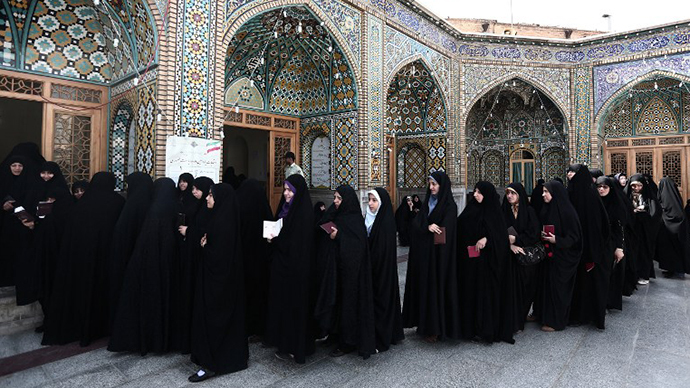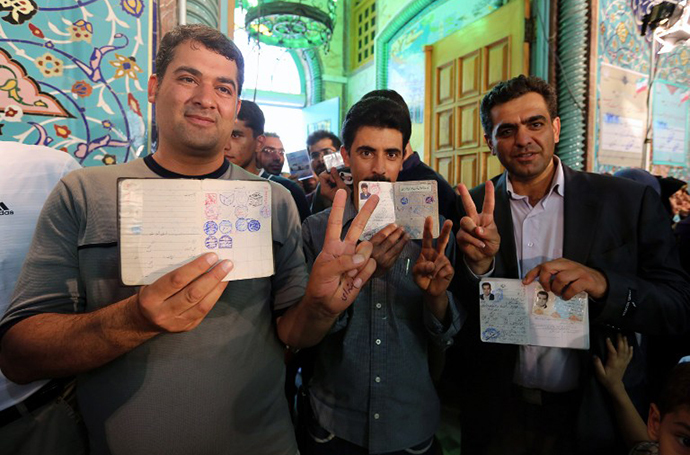New Iranian president ‘won’t be able to change overall strategy’

Although the Iranian election marks the end of an era, it is still a serious question about how much impact the president can have on changing the country’s overall strategy, Reza Marashi from the national Iranian-American Council told RT.
RT:Thank you very much for being with us, um, now,
about this upcoming election. This is an end of an era, really,
the Ahmadinejad era in Iran. What changes can we expect and who
do you think will be the new president?
Reza Marashi: Those are all great questions. You are
right, it is the end of an era, and I think, the biggest change
that we can expect is, perhaps, a change in a tone, or a change
in tactics; not necessarily a change in strategy, because as we
know the Iranian government has elected officials and also has
unelected officials and the big man at the top, the Shah Ali
Khamenei, if you will, is an unelected official, the supreme
leader, so, the new president can come in and he will certainly
have a seat at the table when key decisions are made, but he is
not going to be able to change the overall strategy, at least not
in the short to medium term and in the long run. It is still also
a serious question about how much impact the president can have.
Who it will be? I think it anybody’s best guess. I mean, that is
one of the ironic things about Iran is the elections typically
aren’t free and fair but the outcome of the elections are often
at times unpredictable.
RT:And Ahmadinejad certainly was a character in his own right, but now this: will this election change the Islamic Republic and how they do business with the world, and, then again, how the world deals with Tehran now when Ahmadinejad is kind of being pushed to the side, if you will.
RM: It’s certainly within a round of possibility. If for
no other reason, because Ahmadinejad was politically toxic in
Washington; and then also in European capitals as well, as a
result of his redirect on Israel, um, as if you have somebody new
coming that doesn’t say that, that does open up, if only
slightly, the possibility for moving closer to one another and
having the kind of dialogue that is long overdue, quite frankly,
between Iran and the outside world.

RT:And if you look at the last selection and this
election as well there has been criticism of the entire process
from both inside and outside the country. How good of a barometer
of public opinion will this vote be?
RM: Well, it’s tough to say, because again, the elections in Iran aren’t free or fair by international standards, but at the same time, you started to see particularly in recent days an uptake in interest amongst the Iranian people inside of Iran. They are realizing that the mechanisms that they had at their disposal to hold their government accountable and push for the political, economic, social changes that they seek are few and far between, so there is going to be an attempt to use this election and use their votes to go to the barrow blocks to push for changes, and whether or not the Iranian government allows that to move forward and what the final result will be remains to be seen.
RT:We have touched on this just a little bit, but
there is no doubt that the election will be closely followed by
Washington, you know, Iranian-US relations, always of interest.
What do policy makers in the US expect, from where you are
sitting?
RM: I think the United States government is smart when they said that they don’t have a preferred candidate, but they do have serious concerns about whether or not the elections will be free of fair; and that’s smart, because this really is about the Iranian people at the end of the day. But I think if you were to give a US official some truth serum, they would say that they would prefer a candidate who may be is not like Ahmadinejad, somebody who, if nothing else, doesn’t put forward that kind of redirect that makes engagement in diplomacy more difficult. Now Ahmadinejad is not the only person in Tehran that uses that kind of redirect, so again, it remains to be seen if the new president can change that paradigm, but certainly people in Washington are hoping for somebody that has more political space to do business.
The statements, views and opinions expressed in this column are solely those of the author and do not necessarily represent those of RT.












